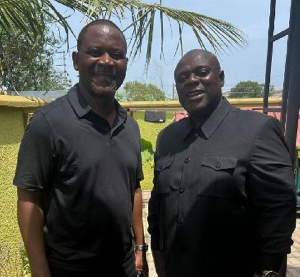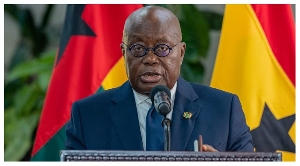- Home - News
- TWI News | TV
- Polls
- Year In Review
- News Archive
- Crime & Punishment
- Politics
- Regional
- Editorial
- Health
- Ghanaians Abroad
- Tabloid
- Africa
- Religion
- Election 2020
- Coronavirus
- News Videos | TV
- Photo Archives
- News Headlines
- Press Release
General News of Saturday, 30 August 2008
Source: GNA
WB Chief Economist: Developing countries must invest in education
Accra, Aug. 30, GNA - World Bank Chief Economist Justin Lin Yifu on Friday said developing countries must invest heavily in the education of their citizenry and upgrade their industrial structures for sustainable growth. He said developing countries could achieve sustained growth if the governments of those countries had the right strategy and played the right role for development.
In a lecture on the theme: "Inclusive Growth and the Role of Knowledge-Lessons from China and Asia," delivered at the University of Ghana, Legon, the Chief Economist, harped on the need for developing countries to specialize and exploit their comparative advantage to development industries for their economies to have competitive advantage.
The lecture, organized by the Economics Department and the Institute of Statistical, Social and Economic Research of the University, attributed the economic successes in Asian countries of Japan, Korea, Taiwan, Hong Kong and Singapore, to the reliance of their comparative advantages in each stage of their development. The lecture formed part of "The Development Dialogue Series", sponsored by the Ghana office of the World Bank, in collaboration with leading Ghanaian think-tanks to promote vibrant discourse on development policy choices.
Prof Lin, who is also the Founding Director of the China Centre for Economic Research at Peking University, identified abundant low cost factors of production, large domestic market, an industrial cluster and competitive market as determinants of competitive advantage. "It is helpful to have large domestic market. However, if an economy's industries are consistent with its comparative advantage, their products can have global markets. Therefore, large domestic market is not a necessary condition", he said.
Prof Lin said after World War II, most developing economies in Latin America, South Asia and Africa attempted to go against their comparative advantage to develop capital-intensive, advanced industries, with rather viability problems and distortions. Some Governments therefore adopted protectionist measures with consequent rent seeking, crony capitalism, low efficiency and poor development performance.
He propounded a "comparative advantage following" (CAF) strategy, which he said attempts to facilitate firms to follow the economy's endowments so that the economy could achieve competitive advantage. "The Government in a developing country that follows the CAF strategy may play a more active role than that of a minimal state," Prof Lin said, adding that when the government pursues a CAF strategy, the endowment structure will upgrade very fast and a certain industrial policy is desirable for facilitating the country's industrial upgrading. Dr K. Y Amoako, President of the African Centre for Economic Transformation, who chaired the session, said application of knowledge in entrepreneurship, research and development were key sources of industrial growth and development.
He said a revolution in the application of science and technology innovations had transformed the East Asian economies within the last 15 years, with two thirds of the accumulation knowledge, and one third being only the application of physical capital.
Prof Kwesi Yankah, Pro Vice Chancellor of the University announced that the University would outline a programme for the study of higher level science in all courses apart from the main science programme. 30 Aug 08










